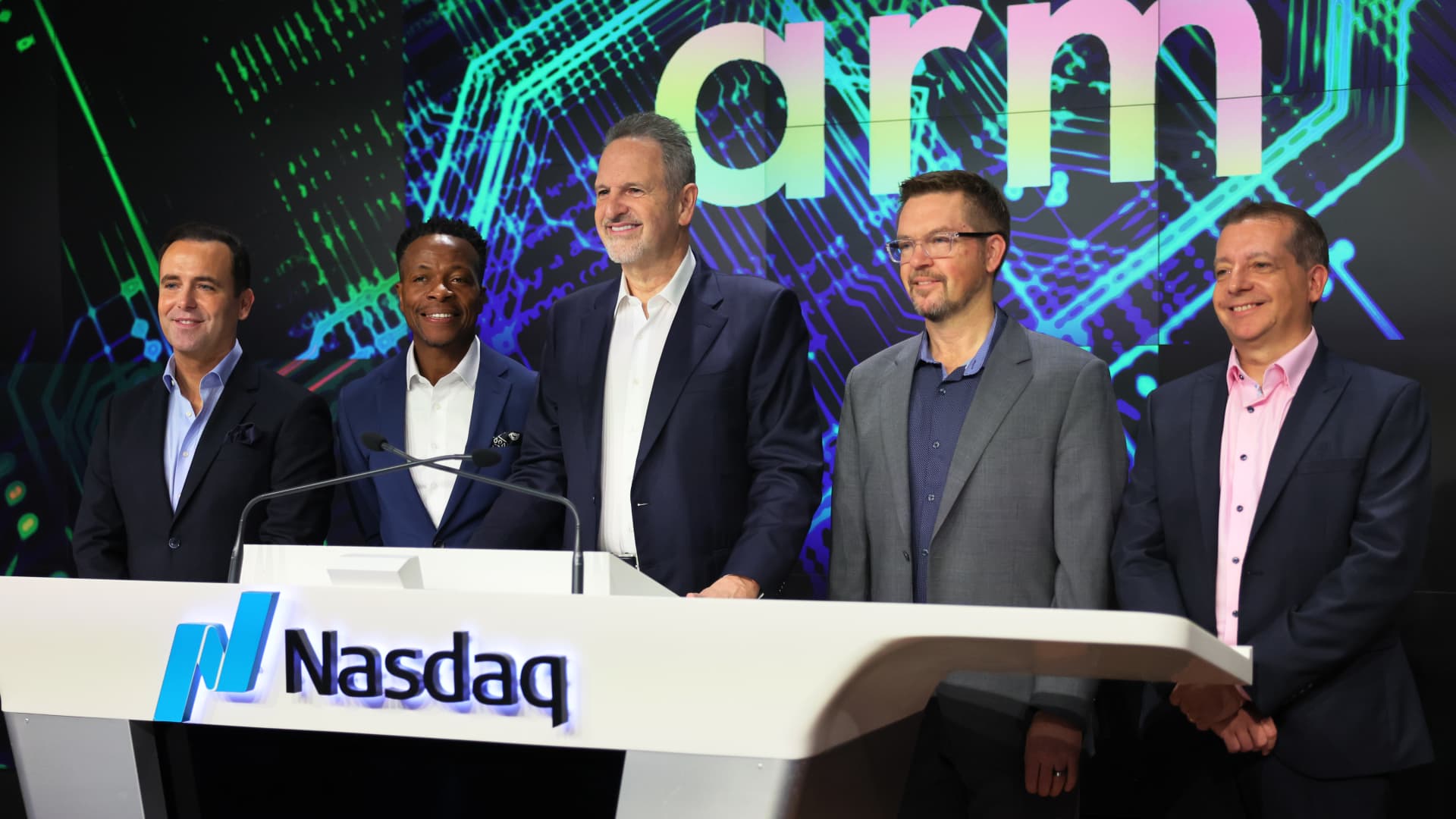Arm Holdings CEO Rene Haas poses for a photo with members of leadership before the Nasdaq opening bell at the Nasdaq MarketSite on September 14, 2023 in New York City.
Michael M. Santiago | Getty Images News | Getty Images
This report is from today’s CNBC Daily Open, our new, international markets newsletter. CNBC Daily Open brings investors up to speed on everything they need to know, no matter where they are. Like what you see? You can subscribe here.
What you need to know today
Markets rebound
U.S. stocks rose Thursday, aided by Arm’s electrifying showing and promising economic data from the U.S. The Dow Jones Industrial Average, in particular, rallied 0.96% for its best day since August. Asia-Pacific markets rose Friday, cheered by China’s better-than-expected data. Japan’s Topix gained 1.25% to hit a 33-year high, as Softbank jumped around 2.7% after Arm’s impressive showing.
China’s economy picks up
Finally, some positive economic data from China. Retail sales in August grew 4.6% from a year ago, beating expectations for 3% growth. Industrial production rose 4.5%, also surpassing the forecast of 3.9%. However, fixed asset investment was still weighed down by the real estate sector, and came in at 3.2%, slightly below the expected growth of 3.3%.
Screeching to a halt
Thousands of members of the United Auto Workers went on strike after the union failed to reach a deal with General Motors, Ford Motor and Stellantis. Workers at three key U.S. assembly plants plan to cease work from Friday — those plants were targeted because they produce highly profitable vehicles that are still in high demand.
[PRO] Cash or stocks?
In recent weeks, U.S. Treasury yields have risen to their highest levels in decades. Meanwhile, major indexes lost ground in August. That has boosted the attractiveness of keeping cash holdings as opposed to investing in stocks. But will that trend hold true for the rest of the year? Analysts from big banks weigh in on the debate between cash and stocks.
The bottom line
When you have a toothache, your whole body feels the pain. In the same vein, when Arm experienced a flush of wellbeing, it radiated through markets’ entire body, giving them their best day in weeks.
“The successful IPO of Arm … instills some confidence that perhaps the capital markets window is going to open again after virtually being closed for the last 18 months,” said Art Hogan, chief market strategist at B. Riley Financial.
Big banks rallied on excitement that the sleepy IPO market for tech companies might finally be stirring. (More IPOs means more dealmaking — and higher revenue — for banks.) Shares of JPMorgan Chase rose almost 2%, Morgan Stanley gained 2.09% and Goldman Sachs popped 2.86%. Tech IPOs are particularly important to Goldman as the bank relies on investment banking more than its rivals. With Instacart and marketing firm Klaviyo set to list soon, Goldman — which has been struggling of late — might see a change in its fortunes.
Goldman and JPMorgan are big components of the Dow. That helped the blue-chip index rise 0.96%, its best day since Aug. 7, giving it a closing level above its 50-day moving average for the first time since Sept. 1. The S&P 500 advanced 0.84%, its best showing in around two weeks, and the Nasdaq Composite gained 0.81%.
Meanwhile, a tame core PPI reading for August assuaged worries after core consumer price index was higher than expected. But because CPI is a lagging indicator, while PPI is considered a leading indicator — that is, it predicts the future state of the economy — markets found solace in the idea that things aren’t as bad as consumer inflation appeared to portray.
And August retail sales jumped 0.6% against the 0.1% expected. Taken together with the PPI report, that suggests the U.S. economy, supported by an indefatigable consumer, might skirt a recession even as inflation gradually cools.
“You’ve got the perfect framework of inflation heading in the right direction, but the economy not falling apart,” Hogan said. “And that really paints the picture that the Fed has done the right thing and we may well be orchestrating that elusive soft landing.”
But the economy is infamously volatile. Hence Hogan’s all-important caveat: “At least that’s the impression we get this week.” Still, after markets ended in the red last week, any reprieve, however temporary, will be welcome.

